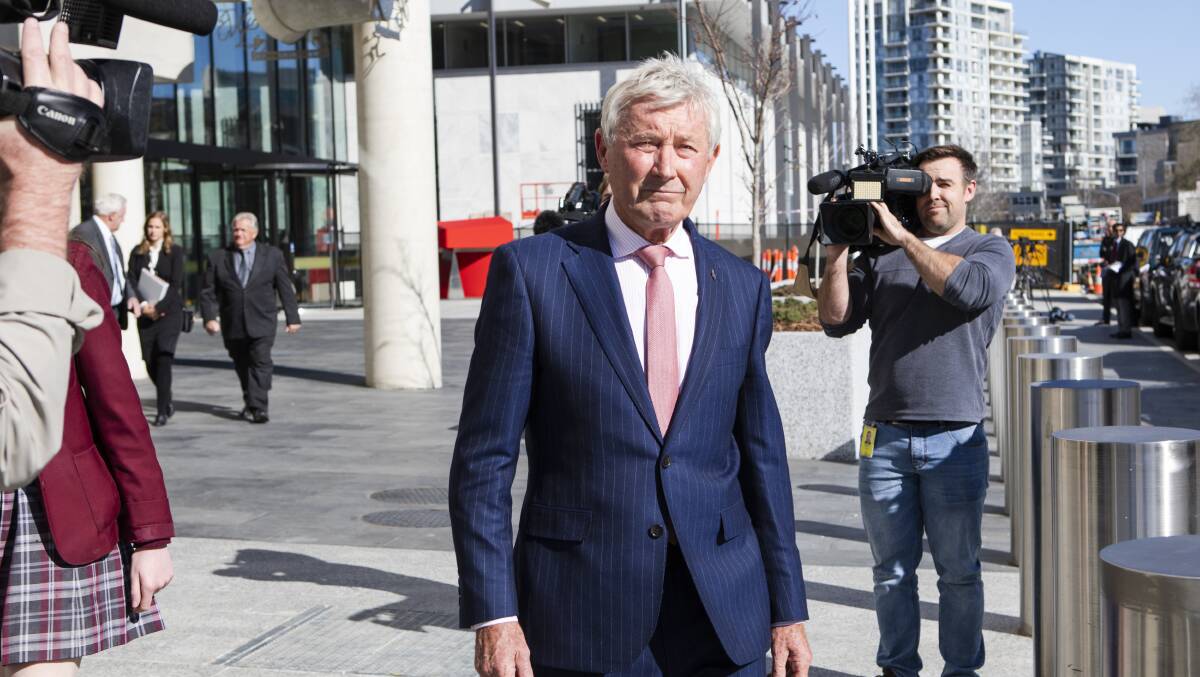The case of a former spy and his lawyer who exposed an Australian bugging operation against the tiny nation of East Timor could be split and heard in different jurisdictions, a court has heard.
Subscribe now for unlimited access.
$0/
(min cost $0)
or signup to continue reading
The spy known only as Witness K and the lawyer Bernard Collaery are accused of conspiring to breach intelligence laws by revealing information about Australia's secret intelligence service. They plan to defend the allegations.
Ken Archer, the barrister for Mr Collaery, told the ACT Magistrates Court on Tuesday that his client had a firm view about how he wanted the case to proceed, and that was by indictment and committal to the ACT Supreme Court.
The prosecution has consented to that course.
That would mean a preliminary hearing to determine national security orders listed for next week would be unnecessary, Mr Archer said, and it could instead be relisted in the higher court at a later date.
However, in a parting that could see the two cases heard separately, Robert Richter QC, the barrister appearing for Witness K, said it was "desired" that his client's case remain in the summary jurisdiction of the ACT Magistrates Court and that they were hopeful of resolving the matter of jurisdiction, which requires consent from prosecutors.

Mr Richter also said the question of national security orders was likely to be resolved by agreement.
A representative of the attorney-general asked the court not to vacate next week's hearing until it was clear it was not necessary or that it became clear Witness K did not oppose the attorney's position.
Chief Magistrate Lorraine Walker declined to vacate next week's hearing as suggested by lawyers for both Mr Collaery and Witness K and instead adjourned the case until August 6 for another mention. She urged the parties that if the preliminary hearing due to start that day was to be vacated that the court be informed as soon as possible.
Witness K and Mr Collaery were charged last year with conspiring to breach s39 of the Intelligence Services Act, which makes punishable the revealing of information of any kind about the Australian Secret Intelligence Service.
The offence at the relevant time carried a maximum penalty of two years in prison.
The case has since crawled through the ACT Magistrates Court making little progress, while defence lawyers and the Commonwealth arm wrestled over a set of orders that will govern how sensitive information will be handled during the trial. Mr Collaery's lawyers have refused to agree to a trial being held in closed court.
The controversial prosecution is about allegations the Australian government spied on East Timor during negotiations with its impoverished neighbour over a lucrative oil and gas treaty.
Much of those details are already public, having been aired in federal parliament and reported in the media.
In 2012, ASIS installed listening devices inside East Timor's ministerial rooms and cabinet offices under the cover of a foreign aid program while Australia was negotiating with the tiny country about oil and gas fields.
Witness K complained about the operation to the Inspector-General of Intelligence and Security. The spy sought and received permission to engage Mr Collaery as an ASIS-approved lawyer.
It was alleged the operation was unlawful, and represented gaining an advantage through improper methods when the Commonwealth was under a legal obligation to act in good faith when negotiating.
In 2013, Mr Collaery arranged for Witness K to give evidence at a hearing overseas but his home and office were raided by ASIO.
The treaty was later renegotiated after the East Timorese took Australia to the Permanent Court of Arbitration. Months after a new treaty was signed federal prosecutors filed charges against Witness K and Mr Collaery.
The charges against Mr Collaery include conversations he had with journalists in the wake of the raid on his home and office.

